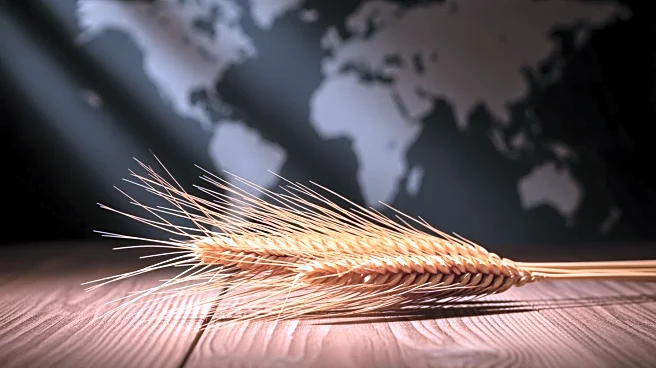What's Happening?
Algeria's state grain agency, OAIC, has purchased approximately 600,000 metric tonnes of milling wheat at an international auction, according to European traders. The auction, which concluded on Wednesday,
saw estimates ranging from 500,000 to 600,000 tonnes, with the majority of traders confirming the higher figure. The purchase price was set at $258.50 per tonne, consistent with previous estimates. The wheat is expected to originate from the Black Sea region, including countries like Romania, Bulgaria, and Ukraine, although Argentine wheat was also considered. Notably, French wheat was excluded from the tender, reportedly due to diplomatic tensions between Algeria and France over Western Sahara.
Why It's Important?
This significant purchase by Algeria highlights the country's strategic efforts to secure food supplies amid global market fluctuations. The exclusion of French wheat underscores the impact of geopolitical tensions on trade, particularly in the agricultural sector. The reliance on Black Sea wheat reflects the region's growing importance in global grain markets. For U.S. stakeholders, this development may influence wheat prices and trade dynamics, as Algeria is a key player in the international grain market. The situation also illustrates the broader implications of diplomatic relations on economic transactions.
What's Next?
The wheat shipment is scheduled in two phases from December, with potential adjustments based on origin. Traders will continue to monitor geopolitical developments, particularly the diplomatic relations between Algeria and France, which could affect future tenders. The U.S. grain market may experience shifts in demand and pricing as Algeria's purchasing decisions influence global supply chains. Additionally, the focus on Black Sea wheat may prompt U.S. exporters to explore competitive strategies to maintain market share.
Beyond the Headlines
The exclusion of French wheat due to diplomatic tensions highlights the complex interplay between politics and trade. This situation may prompt discussions on the ethical considerations of using trade as a tool in diplomatic disputes. The reliance on specific regions for wheat supply also raises questions about food security and the need for diversified sourcing strategies to mitigate risks associated with geopolitical instability.










